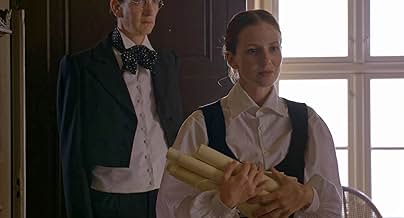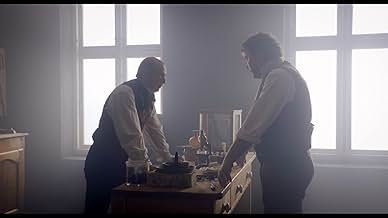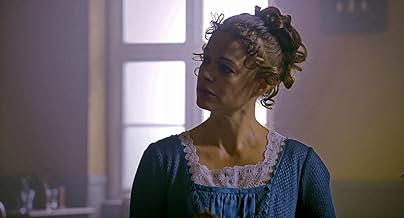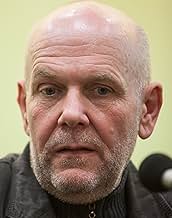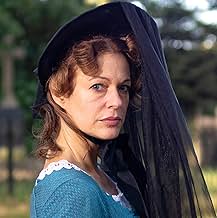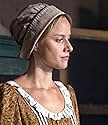IMDb RATING
7.2/10
3.9K
YOUR RATING
1828 in the German port city of Bremen: A female law clerk tries to prove her worth during the investigation of a series of poisonings.1828 in the German port city of Bremen: A female law clerk tries to prove her worth during the investigation of a series of poisonings.1828 in the German port city of Bremen: A female law clerk tries to prove her worth during the investigation of a series of poisonings.
- Director
- Writers
- Stars
- Awards
- 29 wins & 22 nominations total
- Director
- Writers
- All cast & crew
- Production, box office & more at IMDbPro
Featured reviews
Deftly filmed by director Udo Flohr, "Effigy - Poison and the City" offers an absorbing glimpse of history that should satisfy period drama fans. Set in the 19th-century German port city of Bremen, the film is based on the true story of Gesche Gottfried. As one of the first female serial killers ever identified, she was beheaded in 1831 - Bremen's last public execution.
The movie skilfully blends elements of suspense, drama, and psychological thriller, keeping the audience engaged and intrigued throughout. Its meticulous attention to historical detail immerses viewers in the era's atmosphere. The pacing is deliberate - and occasionally slow, but this apparent mundanity underscores the grim brutality of its subject matter.
Lead actress Suzan Anbeh, who portrays Gesche Gottfried, delivers a nuanced and compelling performance, expertly balancing the character's complexity and evoking both empathy and revulsion. She presents Gottfried not just as a villain but as a multifaceted individual shaped by her circumstances and demons. Consequently, the film also delves into themes of gender and societal roles, reflecting on how women were perceived and treated during that time. It offers both entertainment and insight.
Overall, if you're a fan of thought-provoking psychological thrillers and period pieces alike, give Effigy a watch.
The movie skilfully blends elements of suspense, drama, and psychological thriller, keeping the audience engaged and intrigued throughout. Its meticulous attention to historical detail immerses viewers in the era's atmosphere. The pacing is deliberate - and occasionally slow, but this apparent mundanity underscores the grim brutality of its subject matter.
Lead actress Suzan Anbeh, who portrays Gesche Gottfried, delivers a nuanced and compelling performance, expertly balancing the character's complexity and evoking both empathy and revulsion. She presents Gottfried not just as a villain but as a multifaceted individual shaped by her circumstances and demons. Consequently, the film also delves into themes of gender and societal roles, reflecting on how women were perceived and treated during that time. It offers both entertainment and insight.
Overall, if you're a fan of thought-provoking psychological thrillers and period pieces alike, give Effigy a watch.
I liked it because is is a psychological thriller. My husband liked it because of the detailed historical accuracy in costumes and set! It gives you a lot to talk about, with several compelling subthemes (progress, women's rights, psychology, crime investigation). It is also a beautifully filmed movie, with a strangely quiet feel and gorgeous scenery. The tension is on many levels.
Two strong women play convincing roles in the foreground of this real life story.
If the murderess and her plot had been invented, this would hardly be credible, it would simply appear overdone. So the disturbing thing is that this apparently gentle but crafty woman, who poisoned around 15 people over several years before being caught, really existed in Bremen. I watched the film in a cinema in a city in Germany, not far from Bremen, and friends from there know the story from local history.
In the film, the murderess appears to envy the skills and social standing of her opponent, the young law clerk Cato Böhmer.There are a few understandable interpretations of the killer's motivation and psychological disposition, but by and large her actions remain a mystery, so you get something to ponder about afterwards. Why did she kill so many people and at the same time portray herself as a caring person?
The dialogues are enjoyable acoustically, in contrast to many current films, where it is apparently cool to mumble or to accompany the dialogues with loud background noises or music.
The specially produced film music, performed by a 40-piece orchestra, is wonderfully composed and fitting to the whole atmosphere of the film.
The criminal case is integrated into the technical and economic developments of the era around 1830. You learn about railroad construction in Northern Germany together with impressive historical backdrops. As an interesting detail, the use of a kind of mechanical copier is also shown (a device completely unknown to me).
It is a film well worth seeing, not only for fans of historical dialogues. I am already waiting for the next film from Udo Flohr and hope that he will continue to employ such powerful actors.
If the murderess and her plot had been invented, this would hardly be credible, it would simply appear overdone. So the disturbing thing is that this apparently gentle but crafty woman, who poisoned around 15 people over several years before being caught, really existed in Bremen. I watched the film in a cinema in a city in Germany, not far from Bremen, and friends from there know the story from local history.
In the film, the murderess appears to envy the skills and social standing of her opponent, the young law clerk Cato Böhmer.There are a few understandable interpretations of the killer's motivation and psychological disposition, but by and large her actions remain a mystery, so you get something to ponder about afterwards. Why did she kill so many people and at the same time portray herself as a caring person?
The dialogues are enjoyable acoustically, in contrast to many current films, where it is apparently cool to mumble or to accompany the dialogues with loud background noises or music.
The specially produced film music, performed by a 40-piece orchestra, is wonderfully composed and fitting to the whole atmosphere of the film.
The criminal case is integrated into the technical and economic developments of the era around 1830. You learn about railroad construction in Northern Germany together with impressive historical backdrops. As an interesting detail, the use of a kind of mechanical copier is also shown (a device completely unknown to me).
It is a film well worth seeing, not only for fans of historical dialogues. I am already waiting for the next film from Udo Flohr and hope that he will continue to employ such powerful actors.
In this true story, two formidable women deliver impactful performances at the forefront. The narrative, if fabricated, would seem implausively exaggerated. It's unsettling to realize that the seemingly benign yet cunning woman who poisoned about 15 people over years in Bremen actually existed. I viewed this film in a German city close to Bremen, where locals are familiar with this historical incident.
In the movie, the murderess is depicted as jealous of the talents and status of her adversary, the young legal assistant Cato Böhmer. While there are some plausible theories about the murderer's motives and mindset, her actions largely remain an enigma, leaving viewers with lingering questions. What drove her to commit numerous murders while maintaining a facade of benevolence?
The film's dialogue stands out for its clarity, a refreshing change from modern movies that often feature mumbled lines or overpowering background sounds.
The score, created by a 40-member orchestra, beautifully enhances the film's mood.
The plot weaves in the technological and economic progress of the 1830s, educating viewers on railway development in Northern Germany against a backdrop of historical scenery. An intriguing aspect is the depiction of an early mechanical copier, a device I was unfamiliar with.
This movie is a must-see, transcending appeal beyond historical dialogue enthusiasts. I eagerly anticipate Udo Flohr's next creation and hope he continues to cast such compelling actors.
In the movie, the murderess is depicted as jealous of the talents and status of her adversary, the young legal assistant Cato Böhmer. While there are some plausible theories about the murderer's motives and mindset, her actions largely remain an enigma, leaving viewers with lingering questions. What drove her to commit numerous murders while maintaining a facade of benevolence?
The film's dialogue stands out for its clarity, a refreshing change from modern movies that often feature mumbled lines or overpowering background sounds.
The score, created by a 40-member orchestra, beautifully enhances the film's mood.
The plot weaves in the technological and economic progress of the 1830s, educating viewers on railway development in Northern Germany against a backdrop of historical scenery. An intriguing aspect is the depiction of an early mechanical copier, a device I was unfamiliar with.
This movie is a must-see, transcending appeal beyond historical dialogue enthusiasts. I eagerly anticipate Udo Flohr's next creation and hope he continues to cast such compelling actors.
10gareth33
The film's foundation in a true story significantly and it really impacted my admiration for it. Kudos for adeptly and artistically presenting the narrative with a robust feminist perspective. The custom-composed film score, executed by a 40-piece orchestra, is masterfully crafted and seamlessly aligns with the overall film ambiance. While not adhering to a modest budget, this isn't your typical Hollywood production, demanding your focused engagement. However, the investment is undeniably rewarding, even for those who aren't typically drawn to historical dialogues. Encountering films like this isn't a frequent occurrence, so I'm genuinely pleased to have come across it. I'll definitely make a point to recommend it to my family and friends.
- How long is Effigy: Poison and the City?Powered by Alexa
Details
- Release date
- Countries of origin
- Official sites
- Languages
- Also known as
- Effigie - Das Gift und die Stadt
- Filming locations
- Mecklenburg, Germany(location)
- Production company
- See more company credits at IMDbPro
Box office
- Budget
- $485,000 (estimated)
- Runtime
- 1h 25m(85 min)
- Color
- Sound mix
- Aspect ratio
- 1.85 : 1
Contribute to this page
Suggest an edit or add missing content





